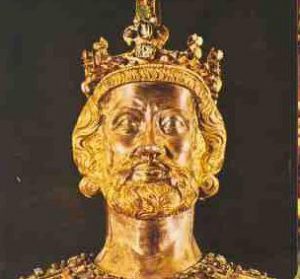Charlemagne Death
Charlemagne passed away on January 28, 814 at the age of 71 in Aachen, Holy Roman Empire.
When did Charlemagne die?
January 28, 814How old was Charlemagne when died?
71Where did Charlemagne die? What was the location of death?
Aachen, Holy Roman Empire
Charlemagne Birthday and Date of Death
Charlemagne was born on April 2, 742 and died on January 28, 814. Charlemagne was 71 years old at the time of death.
Birthday: April 2, 742
Date of Death: January 28, 814
Age at Death: 71
Is Charlemagne's father, Pepin the Short, dead or alive?
Pepin the Short's information is not available now.
Is Charlemagne's mother, Bertrada of Laon, dead or alive?
Bertrada of Laon's information is not available now.
Charlemagne - Biography
Charlemagne was King of the Franks from 768 and Emperor of the Romans from 800 to his death in 814. He expanded the Frankish kingdom into an empire that incorporated much of Western and Central Europe. During his reign, he conquered Italy and was crowned by Pope Leo III on 25 December 800. This temporarily made him a rival of the Byzantine Emperor in Constantinople. His rule is also associated with the Carolingian Renaissance, a revival of art, religion, and culture through the medium of the Catholic Church. Through his foreign conquests and internal reforms, Charlemagne helped define both Western Europe and the Middle Ages. He is numbered as Charles I in the regnal lists of Germany, the Holy Roman Empire, and France.
Charlemagne had eighteen children with eight of his ten known wives or concubines. Nonetheless, he had only four legitimate grandsons, the four sons of his fourth son, Louis. In addition, he had a grandson (Bernard of Italy, the only son of his third son, Pippin of Italy), who was illegitimate but included in the line of inheritance. Among his descendants are several royal dynasties, including the Habsburg, Capetian and Plantagenet dynasties. By consequence, most if not all established European noble families ever since can genealogically trace their background to Charlemagne.
In 813, Charlemagne called Louis the Pious, king of Aquitaine, his only surviving legitimate son, to his court. There Charlemagne crowned his son as co-emperor and sent him back to Aquitaine. He then spent the autumn hunting before returning to Aachen on 1 November. In January, he fell ill with pleurisy. In deep depression (mostly because many of his plans were not yet realised), he took to his bed on 21 January and as Einhard tells it:
"He died January twenty-eighth, the seventh day from the time that he took to his bed, at nine o'clock in the morning, after partaking of the Holy Communion, in the seventy-second year of his age and the forty-seventh of his reign."








